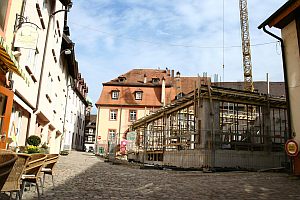The Upper Rhine region is attractive and grows dynamically. Negative impacts are urban sprawl and excessive land use. Both are a threat to the region’s attractiveness in the long term. currently, twelve small and medium-sized municipalities on the Upper Rhine have become involved in a transboundaryproject. They exchange knowledge and wish to develop concepts as to how land use can be controlled intelligently and sustainably. Together with the University of Strasbourg, KIT scientists coordinate the German-French project.
The project is for three years and is funded with a total budget of EUR 490,000. Half of the project costs are financed by the European Union from the European Funds for Regional Development (EFRE). The project “Quality-oriented land use management in small and medium-sized municipalities on the Upper Rhine” pursues four objectives. Through discussions and workshops, the twelve pilot municipalities exchange knowledge and experience from both sides of the border in order to launch new concepts for an intelligent land management. In a second step, elected representatives of the municipalities, technical experts, and universities will develop innovative guidelines and practical tools adapted to the target group.
“In a third step, the results will be implemented in model municipalities, i.e. ideas and tools will be transferred,” explains Jana Wegner from the German-French Institute for Environmental Research (DFIU) of KIT. Finally, a network of all actors will be generated for continuous knowledge generation. KIT manages the project and coordinates it together with the University of Strasbourg.
In a preliminary study, the regions of Alsace and Baden were found to be ideal for the project. They have many municipalities with less than 20,000 inhabitants. As prospering locations of industry and culture, they face an increasing pressure on land, but technical and financial means are lacking to implement an optimized area management. “Due to its high economic performance and long standing transboundary cooperation, the trinational Upper Rhine region plays a leading role as a European metropolitan region,” adds project coordinator Dr. Ingmar Gehrke from the DFIU. The project partners can use existing potentials. In the region, three different planning cultures, a multitude of methods, experience, concepts, and ideas exist, which can now be transferred to new types of land use management.
Land use management is an interdisciplinary field. The concepts and close-to-practice information systems to be developed are supposed to help all actors of land management. The project addresses the planning level with tasks such as construction planning, prevention of vacant parcels, or landrecycling as well as the economic level focusing on topics like support of urban development, deduction for mileage, local image, and control instruments, including citizen participation, public relations, and marketing. “Generally, municipal land management aims at reducing land consumption and protecting the soil,” explains urban planner Wegner. “But the project also concentrates on quantitative aspects, such as an optimized use of land as a resource, and qualitative aspects, such as the conservation of a lively town center through inward development.”
A large number of participants and funding organizations have joined the project. Half of the INTERREG project is funded by the EU from the European Funds for Regional Development (EFRE). The program’s slogan is: “Transcending borders with every project.” On the German side, the project is co-funded by the Baden-Württemberg Ministry for the Environment and Transport and by KIT. On the French side, funds are provided by the Région Alsace, the Conseil Général du Bas-Rhin, the Direction Régionale de l’Environnement, de l’Aménagement et du Logement (DREAL) Alsace, and the Université de Strasbourg. Apart from the twelve pilot municipalities from Au am Rhein to Sexau, eight non-cofunding partners have joined the project, among them the Kanton of the District of Basel and the Vosges Mountains Nature Park.
Project costs are planned to amount to EUR 492,970. “Our project is part of the EU program INTERREG IV-A Upper Rhine,” explains Professor Frank Schultmann, Director of the DFIU. The “A” stands for border-crossing cooperation in contrast to cooperation of transnational (B) and interregional (C) character. In a so-called “operational program”, the program strategy and main topics are defined.
The German-French Institute for Environmental Research (DFIU; http://www.dfiu.kit.edu) of KIT accounts for a widespread wish in France and Germany for an increased border-crossing scientific cooperation in the field of environmental research. The binational and interdisciplinary research activities focus on the environmental aspects of air, waste, and energy and on aspects of waste management and recycling, land management and material flow management, electromobility, sustainable construction, technology assessment, and risk management. Further information can be found under:
http://www.dfiu.kit.edu/flaeche.php
Karlsruhe Institute of Technology (KIT) is a public corporation and state institution of Baden-Württemberg, Germany. It fulfills the mission of a university and the mission of a national research center of the Helmholtz Association. KIT focuses on a knowledge triangle that links the tasks of research, teaching, and innovation.

